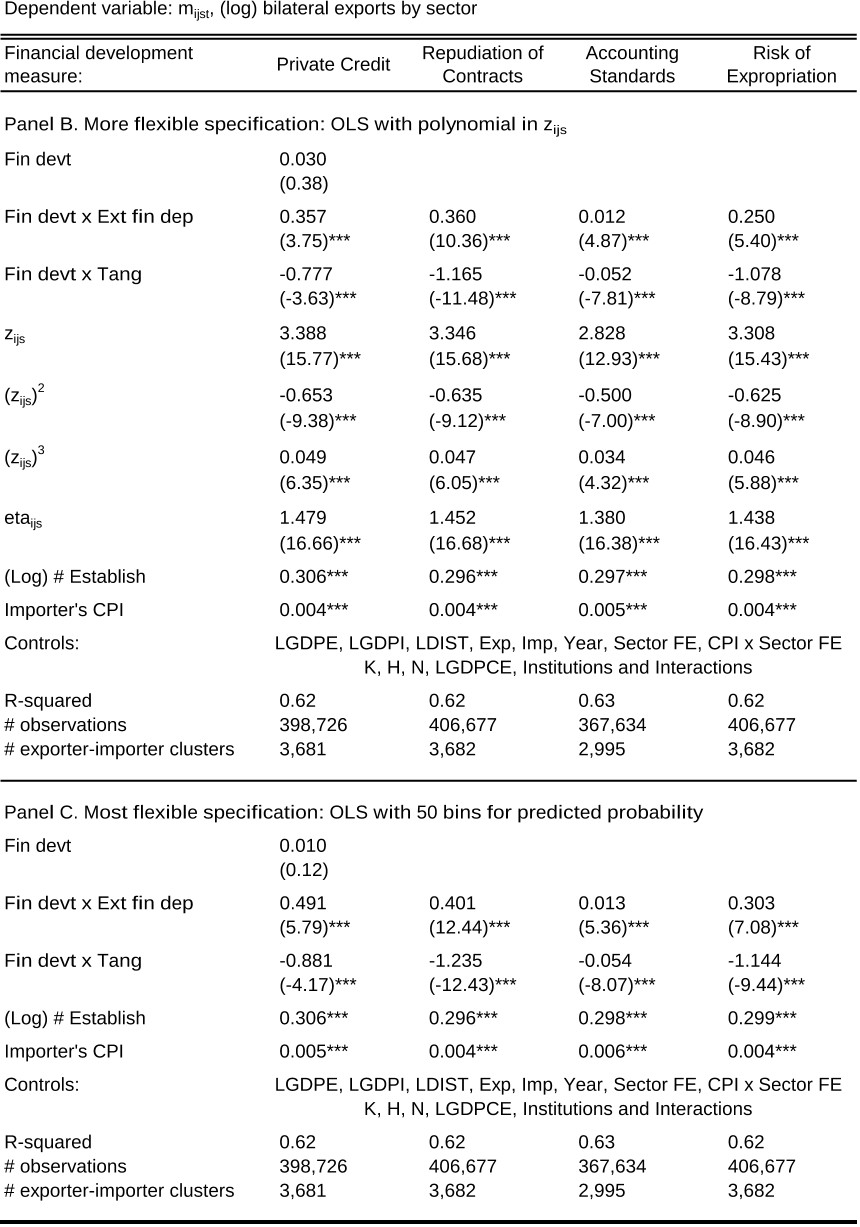Credit Constraints, Heterogeneous Firms and International Trade
Reads0
Chats0
TLDR
This article examined the detrimental consequences of financial market imperfections for international trade and developed a heterogeneous-firm model with countries at different levels of financial development and sectors of varying financial vulnerability.Abstract:
This paper examines the detrimental consequences of financial market imperfections for international trade. I develop a heterogeneous-firm model with countries at different levels of financial development and sectors of varying financial vulnerability. Applying this model to aggregate trade data, I study the mechanisms through which credit constraints operate. First, financial development increases countries' exports above and beyond its impact on overall production. Firm selection into exporting accounts for a third of the trade-specific effect, while two thirds are due to reductions in firm-level exports. Second, financially advanced economies export a wider range of products and their exports experience less product turnover. Finally, while all countries service large destinations, exporters with superior financial institutions have more trading partners and also enter smaller markets. All of these effects are magnified in financially vulnerable sectors. These results have important policy implications for less developed economies that rely on exports for economic growth but suffer from poor financial contractibility.read more
Figures

Table 10. Economic Significance: Predicted vs. Actual Trade Growth 
Table 9. Economic Significance: Comparative Statics 
Table 5. Financial Development and Firm-Level Exports 
Figure 3. The Productivity Cut-off for Exporting 
Table 5. Financial Development and Firm-Level Exports 
Table 1. Export Patterns in the Data
Citations
More filters
Journal ArticleDOI
Capital Market Frictions and Economic Geography
Jan Kranich,Hendrik Hakenes +1 more
TL;DR: In this paper, a theoretical model based on capital market frictions is proposed to explain agglomeration primarily through the channels of increasing returns, monopolistic competition and international factor mobility.
Posted Content
Productivity, Firm Size, Financial Factors, and Exporting Decisions: The case of Japanese SMEs
Kazuo Ogawa,Ichiro Tokutsu +1 more
TL;DR: In this article, an empirical attempt to compare the exporting behavior of small and medium-sized enterprises (SMEs) with large firms from the viewpoints of export market participation decision (extensive margin) and export volume decision (intensive margin), using firm-level panel data.
Posted Content
Barriers to exporting: Firm-Level Evidence from Germany
TL;DR: In this paper, the authors present new empirical evidence on the importance of low productivity as a barrier to the international expansion of firms and present a detailed micro-level dataset of German firms which simultaneously provides information on exports, financial frictions, and labor market conditions.
Journal ArticleDOI
Financial system, R&D intensity and comparative advantage
Nurullah Gur,Veysel Avsar +1 more
TL;DR: In this article, the authors examined the effects of different dimensions of financial system on exports through R&D channel and found that financial development and financial integration increase exports relatively more in RDC intensive industries.
Journal ArticleDOI
Financial underdevelopment, distorted lending and export market survival
Ziliang Deng,Lei Hou +1 more
TL;DR: In this article, the authors examined the impact of financial development on exporter survival in foreign markets with Chinese firm-level data over the period 1998-2008 and found that a larger scale and greater efficiency of bank lending and less state intervention facilitate while the relative abundance of long-term credit deteriorates exporters' survival.
References
More filters
Posted Content
Law and Finance
Rafael La Porta,Rafael La Porta,Florencio Lopez de Silanes,Florencio Lopez de Silanes,Andrei Shleifer,Andrei Shleifer,Robert W. Vishny,Robert W. Vishny +7 more
TL;DR: This paper examined legal rules covering protection of corporate shareholders and creditors, the origin of these rules, and the quality of their enforcement in 49 countries and found that common law countries generally have the best, and French civil law countries the worst, legal protections of investors.
Journal ArticleDOI
Law and Finance
TL;DR: In this article, the authors examined legal rules covering protection of corporate shareholders and creditors, the origin of these rules, and the quality of their enforcement in 49 countries and found that common-law countries generally have the strongest, and French civil law countries the weakest, legal protections of investors, with German- and Scandinavian-civil law countries located in the middle.
Journal ArticleDOI
The Impact of Trade on Intra-Industry Reallocations and Aggregate Industry Productivity
TL;DR: This paper developed a dynamic industry model with heterogeneous firms to analyze the intra-industry effects of international trade and showed how the exposure to trade will induce only the more productive firms to enter the export market (while some less productive firms continue to produce only for the domestic market).
Journal ArticleDOI
Finance and Growth: Schumpeter Might Be Right
TL;DR: In this paper, the authors examined a cross-section of about 80 countries for the period 1960-89 and found that various measures of financial development are strongly associated with both current and later rates of economic growth.
ReportDOI
Financial Dependence and Growth
Raghuram G. Rajan,Raghuram G. Rajan,Raghuram G. Rajan,Luigi Zingales,Luigi Zingales,Luigi Zingales +5 more
TL;DR: This paper examined whether financial development facilitates economic growth by scrutinizing one rationale for such a relationship; that financial development reduces the costs of external finance to firms, and found that industrial sectors that are relatively more in need of foreign finance develop disproportionately faster in countries with more developed financial markets.